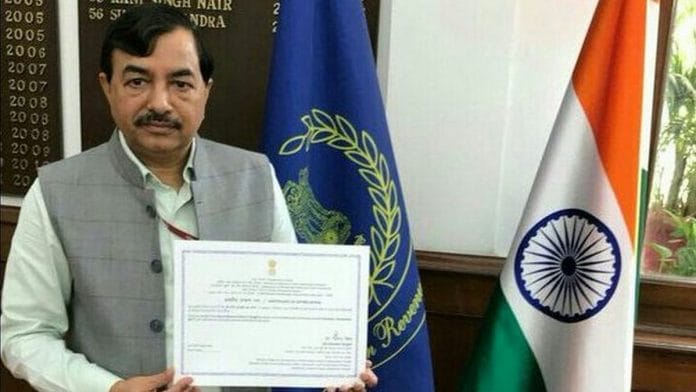New Delhi: The Narendra Modi government has appointed Indian Revenue Service (IRS) officer Sushil Chandra as the third election commissioner, completing the team that will oversee the Lok Sabha polls due in April-May.
The three-member body now comprises Chief Election Commissioner Sunil Arora and Election Commissioners Chandra and Ashok Lavasa.
A law ministry order announcing Chandra’s appointment as an election commissioner came on Thursday.
Top sources in the Election Commission said the presence of an IRS officer among the top three poll officials would help the agency deal with issues of expenditure.
Before Chandra, the only IRS officer to be appointed to the commission was T.S. Krishnamurthy, who went on to become the chief election commissioner in 2004.
Also read: Election Commission is exploring expense limits for candidates based on constituency
Top tax sleuth
Chandra, 61, an IRS officer of the 1980 batch, is the chairman of the Central Board of Direct Taxes (CBDT), the apex policy-making body of the Income Tax Department.
He was appointed to the post on 1 November 2016. He was due to retire in 2017, but Chandra has since been given two extensions.
Since Chandra was scheduled to serve as CBDT chair till May 2019, he will now have to resign from the body a few months in advance.
Also read: Disqualify candidates for false disclosures, Election Commission to suggest to law ministry
‘Soft-spoken’
An IIT graduate with roots in Moradabad, Uttar Pradesh, Chandra went on to study law before clearing the civil services exam.
In 2016, Chandra became key to the demonetisation project, which was announced a week after he joined the CBDT.
“He was both member (investigation) and CBDT chairman at the time of demonetisation, so he played a key role during the income tax raids that followed the exercise,” a senior IRS officer told ThePrint. “During the time, the taxes collected sky-rocketed under his supervision.”
According to the IRS officer, Chandra has been at the forefront of the government’s attempts to unearth black money, and has led efforts to make the process of investigation into tax evasion a technology- and data-driven exercise “so it’s non-intrusive”.
“He’s a soft-spoken man, but a strong administrator,” the officer added.
“For us IRS officers, it is great to see one of our own appointed in the Election Commission, which is so crucial to the functioning of the democracy,” the IRS officer said.






